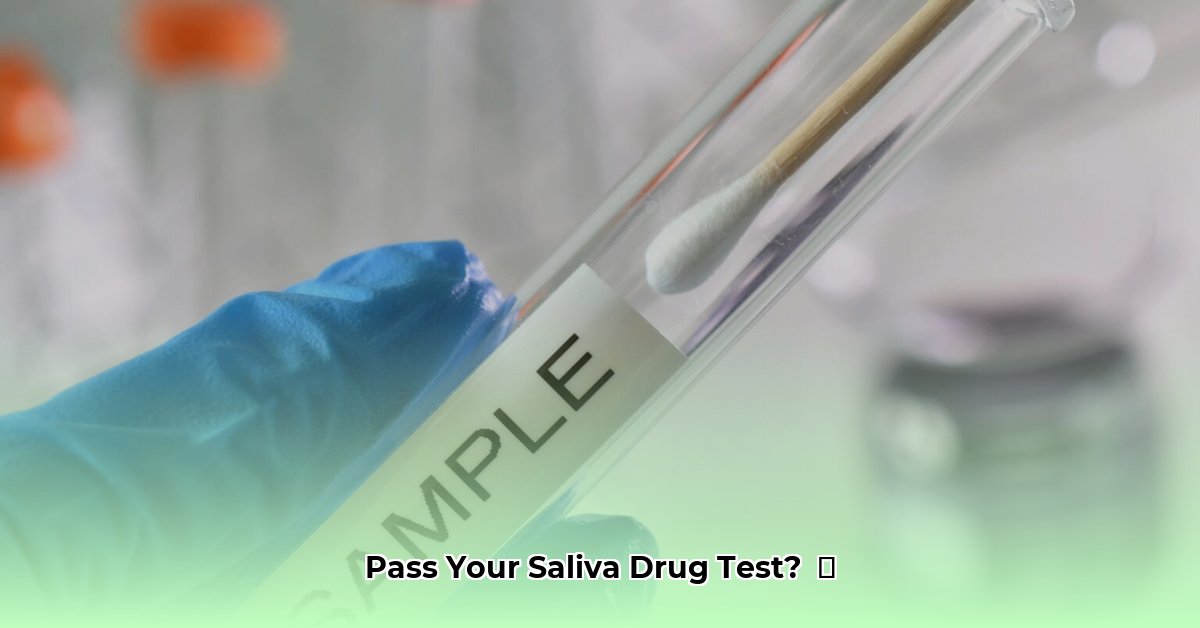Facing a saliva drug test can be stressful. Let’s be upfront: abstinence is the only guaranteed way to pass. This guide provides factual information about saliva drug tests, debunks common myths, and explores strategies some people try, emphasizing their limitations and potential risks. We’ll also connect you with harm reduction resources and discuss legal considerations.
Understanding Saliva Drug Tests
How They Work
Saliva drug tests detect drug metabolites—what’s left after your body processes drugs—not the drugs themselves. Think of them as “crumbs” after eating a cookie. These tests are used to detect recent drug use, typically within the past few days. A swab collects saliva from your mouth, which is then analyzed either on-site or in a lab.
What They Detect and For How Long
Saliva tests can detect various substances, including marijuana, cocaine, amphetamines, methamphetamines, opioids, and benzodiazepines. Detection windows vary depending on the substance, individual metabolism, frequency of use, and the test’s sensitivity. Generally, detection times range from a few hours to a few days, but some substances, like marijuana, may be detectable for longer in heavy users. Some research suggests that marijuana can be detected for up to a month in chronic users.
| Substance | Approximate Detection Window |
|---|---|
| Alcohol | Up to 24 hours |
| Marijuana (THC) | 1-3 days, possibly longer |
| Cocaine | Up to 48 hours |
| Amphetamines | Up to 48 hours |
| Methamphetamine | Up to 72 hours |
| Opioids | Up to 72 hours |
| Benzodiazepines | Up to 10 days |
It’s crucial to remember these are estimates. Individual factors can significantly influence detection times.
Debunking the Myths: Quick Fixes? Unlikely.
The internet is rife with “quick fixes” like detox drinks, special mouthwashes, and magic pills. Let’s be clear: these claims are largely unsubstantiated. There’s no magic bullet to instantly cleanse your system. Your body processes drugs at its own pace. These products may offer a false sense of security and some may even pose health risks.
Strategies with Limited and Unproven Effectiveness
While abstinence remains the most reliable approach, let’s explore methods some people attempt, acknowledging their limited and often unproven effectiveness. We do not endorse these methods, but provide information for informed decision-making.
Stimulating Saliva Production
Chewing gum or consuming sour candies is thought to increase saliva flow, potentially diluting metabolite concentration. However, scientific evidence supporting this is weak. It’s unlikely to significantly impact test results, especially with higher metabolite levels.
Oral Rinses
Some use mouthwash or hydrogen peroxide, hoping to mask or flush out metabolites. Again, effectiveness is largely unproven. Swallowing hydrogen peroxide can be dangerous and is strongly discouraged.
Brushing and Gargling
While good oral hygiene is always recommended, it’s improbable to significantly affect saliva drug test results. Drug metabolites reside deeper in tissues and saliva glands, making surface cleaning ineffective for this purpose.
Over-Hydration
Drinking excessive amounts of water is believed by some to dilute saliva and lower metabolite concentration. However, there’s little scientific backing for this, and overhydration can be dangerous.
Specialized Mouthwashes
Some mouthwashes are marketed specifically for drug tests. While anecdotal reports of success exist, scientific evidence supporting their effectiveness is limited. Always follow product instructions carefully and don’t expect guaranteed results.
Strategic Timing
Delaying the test as long as possible might slightly reduce detection chances as metabolite concentration gradually decreases. This is not a foolproof method and isn’t a substitute for abstinence.
Harm Reduction and Next Steps
If you’re struggling with substance use, help is available. The Substance Abuse and Mental Health Services Administration (SAMHSA) offers resources and support. Contact their national helpline at 1-800-662-HELP (4357) for treatment options and guidance.
Legal Considerations
Attempting to cheat a drug test can have legal consequences in some jurisdictions, potentially more severe than a positive result. Consult a legal professional for advice specific to your area.
Navigating a Failed Test
Failing a drug test can be disheartening, but the consequences vary depending on the context (employment, legal obligations, etc.). Open communication with relevant parties is often the best approach. Trying to conceal a failed test may lead to further complications.
FAQ
- How long does THC stay in saliva? THC is typically detectable for 1-3 days, but may remain longer in chronic users, potentially up to a month in some cases.
- Can I drink water before a saliva drug test? You’ll likely be asked to refrain from eating or drinking anything, including water, for about 10 minutes before the test.
Important Disclaimer: This information is for educational purposes only and does not constitute medical or legal advice. Consult qualified professionals for personalized guidance.
- Divided Food Containers Are Meal Preps Secret Weapon - February 7, 2026
- Food Kits for Adults Offer Fun DIY Cooking Adventures - February 6, 2026
- Food Making Kits Bring Easy, Fun Homemade Dishes to Your Kitchen - February 5, 2026










